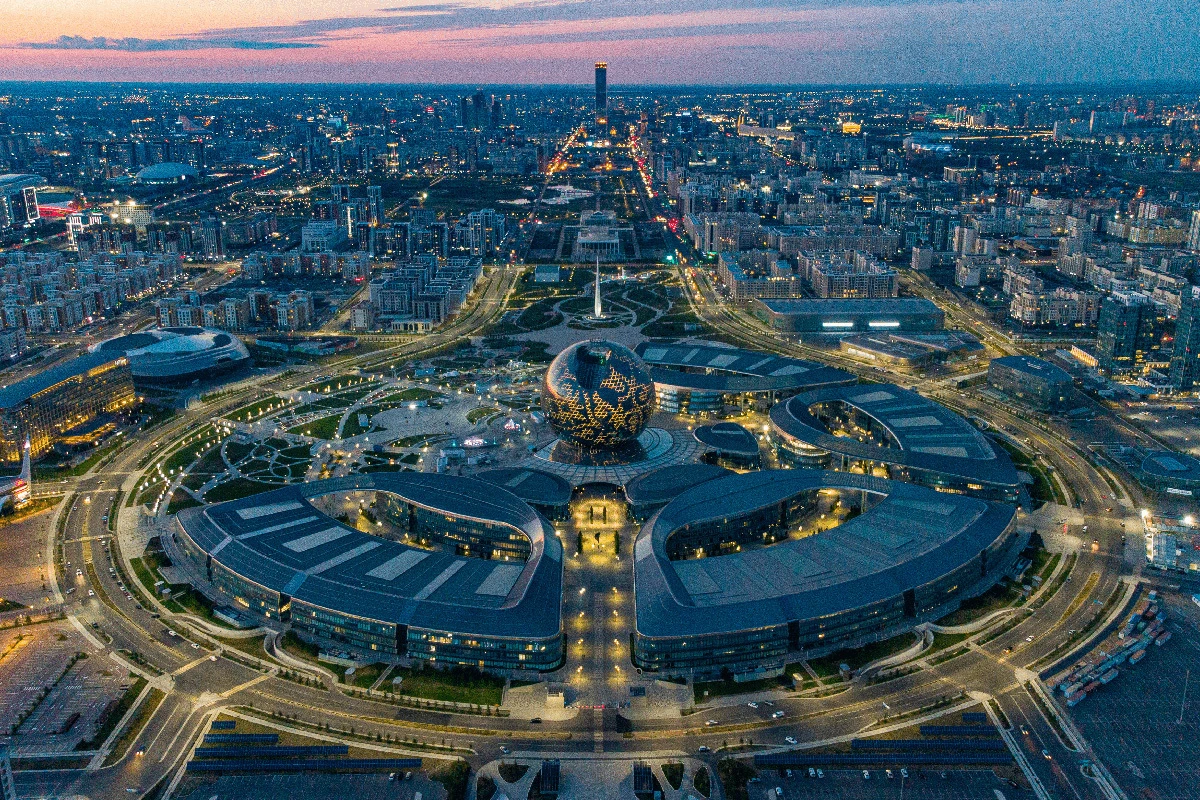In an era marked by geopolitical uncertainties, climate change, and economic instability, international cooperation has never been more crucial, and middle powers are stepping up to serve functions once reserved for the world’s superpowers. In this challenging landscape, Kazakhstan plays a unique role bridging East and West, facilitating dialogue and exchanges globally.

Photo credit: astanainternationalforum.org
Kazakhstan is poised to host a conversation addressing these global complexities at the Astana International Forum 2025, which is to welcome around 5,000 delegates from more than 50 countries from May 29 to 30 in the Kazakh capital. Under the theme Connecting Minds, Shaping the Future, the event will focus on foreign policy, energy, and finance, as it seeks to inspire cross-border dialogue and collaborative solutions to some of the most pressing issues facing our world today.
The Middle Power
Kazakhstan’s strategic position in the heart of Eurasia, bordered by Russia to the north, China to the east, the Kyrgyz Republic, Uzbekistan, and Turkmenistan to the south, and the Caspian Sea to the west, places it at a crossroads of major geopolitical interests and transcontinental trade dynamics. The country’s multi-vector foreign policy approach prioritizes cooperation with its international partners, including its neighbors and beyond. “By leveraging our geographic and strategic position,” says Roman Vassilenko, Deputy Foreign Minister of Kazakhstan, “Kazakhstan is enhancing its contribution to promoting global trade, strengthening economic relations, and fostering sustainable growth both domestically and across the region.”
The nation’s active participation in major trade corridors, including the Belt and Road Initiative (BRI) and the Trans-Caspian International Transport Route (TITR), also known as the Middle Corridor, showcases its role in fostering trade and diplomatic relationships between East and West. In 2024, the volume of goods transported via the Middle Corridor surged by 62% to reach 4.5 million tons, while it is estimated to reach an annual throughput capacity of 10 million tons by 2027.
Over 80% of goods from China and Central Asia destined for land-based transportation to Europe are transported via Kazakhstan, reflecting its role as a key transit hub in Eurasian trade. Building on this momentum, Kazakhstan aims to further contribute to regional and global development, creating bridges between continents, cultures, and nations.
The nation has also worked to solidify its international reach through multinational initiatives such as the Central Asia Plus Framework, which aims to strengthen regional collaboration. “The narrative around Central Asia is shifting towards a more cooperative region,” says Vassilenko, adding that common challenges, such as fighting global warming and ensuring sustainable economic growth, are playing a unifying role.
Kazakhstan’s proactive engagement in global trade and economic forums highlights its commitment to diverse partnerships, paving the way for a more resilient economic future by developing non-oil industries and funding infrastructure development and digital innovation. In 2024, this approach contributed to a 4.7% economic growth, driven primarily by expansion in non-oil sectors. Over the past year, the country has also chaired several major international organizations, including the Shanghai Cooperation Organisation, the Collective Security Treaty Organization, the Conference on Interaction and Confidence-Building Measures in Asia, the Organization of Turkic States, and the Islamic Organisation for Food Security. It continues to chair the International Fund for Saving the Aral Sea this year.
The Advocate
As a champion of the Great Gain for All principle, Kazakhstan has taken a unified approach to tackling political, social, and environmental challenges. “It reflects our belief that cooperation, rather than competition, should be the driving force in global relations,” says Vassilenko.
Aligning its actions with the United Nations’ overarching commitment to global security and stability, Kazakhstan has been actively supporting UN peacekeeping efforts, deploying as many as 650 peacekeepers to participate in various missions worldwide. Since independence, Kazakhstan has allocated $600 million for humanitarian and development assistance and has also provided a neutral platform for facilitating peaceful resolutions to regional conflicts, including the Astana Process on Syria since 2017 and last year’s talks between Azerbaijan and Armenia.
The Changemaker
In addition to its diplomatic endeavors, Kazakhstan is playing a crucial role in supporting the stability of global energy markets. As well as supplying 43% of the world’s uranium needed to fuel nuclear power plants, Kazakhstan also produces more than half of the 34 critical raw materials of high importance to the EU. In addition to these resources, Kazakhstan is investing in green hydrogen production, as well as wind and solar energy, aiming to become a leader in renewable energy exports. By investing in energy infrastructure and pursuing policies that support energy export, Kazakhstan is positioning itself as a long-term partner for the EU in the energy domain.
Through its strategic initiatives and diplomatic engagements, Kazakhstan continues to shape the course for global governance to reflect the need for peace and stability in the multipolar reality of the 21st century.
The article was originally published in CNN International as part of the Astana International Forum’s 2025 brand.


